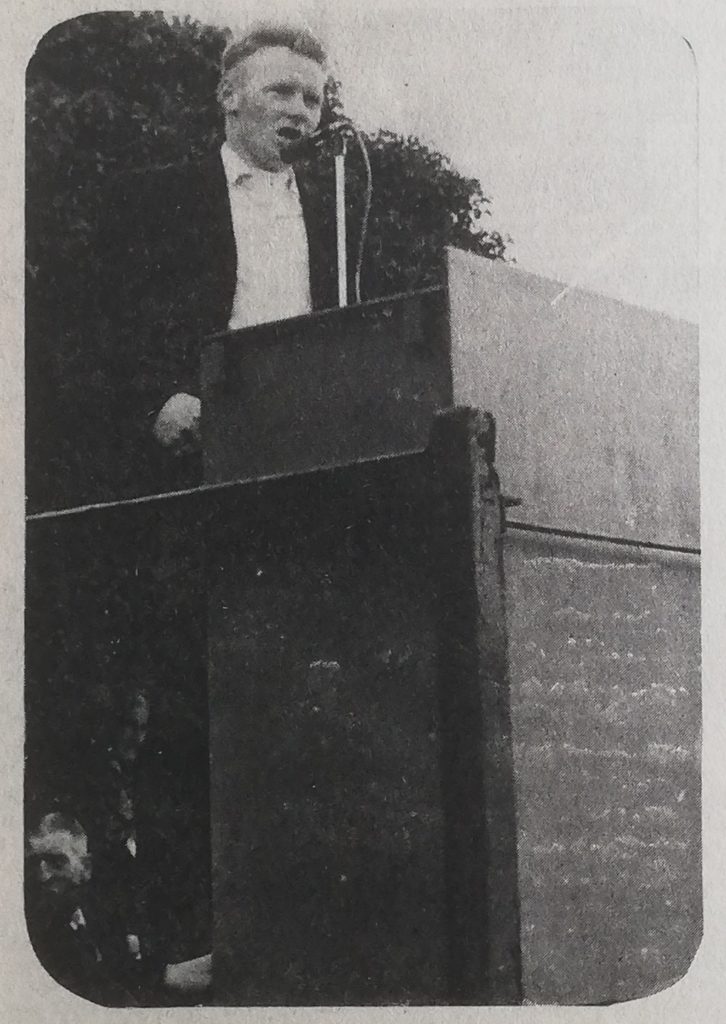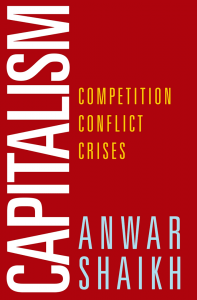In 2016, the Workers’ Party supported the Brexit referendum, largely on the basis of the EU’s extreme pro-capitalist nature. The devastation wrought by years of austerity, if not imposed by Brussels, were very much supported by it and to the benefit of its dominant players, namely France and Germany.
Our 2016 position made some sense in that the EU really is an extreme pro-capitalist entity, bereft of the usual ameliorating side-effects that came with being a modern nation state: a healthcare system, education, welfare and so on.
Nevertheless, the Party position in 2016 was not balanced by a sufficiently careful analysis of the consequences of Brexit actually winning the referendum. In effect the Party took the easy path of being critical of the EU while assuming the referendum would be lost and that we would not, therefore, have to reckon with the aftermath of the UK leaving the EU.
That proved a miscalculation and the Party has had virtually no communications on either the economic or political and constitutional issues flowing from Brexit since 2016. This is a bizarre omission given it has been the single most important political issue over the last four years.
In recent months we have begun a process of rectifying this error, with briefing papers and debates at the Ard Comhairle, which in turn were circulated to branches for discussion. Arising from that, an immediate position of opposing a hard border in Ireland was adopted and the intention to consider the longer-term implications reiterated.
The basic perspective of this piece is to argue that we should approach the question of Brexit and the EU as a strategic one rather than as one of policy. That is, our approach to both issues is not whether they are good or bad in themselves (often the answer is mixed) but how can major issues, most of which are outside of our control, be used to advance our agenda of a building a socialist republic.
Politics as strategy, not as Policy
The Party had a series of major strategic shifts in the 1965-1980 period, with the crucial one being the acceptance of socialism as the ultimate goal and mass working class organisation as the agent capable of achieving it. This rendered armed struggle not only redundant but counter-productive. As well as inflicting much personal suffering, armed struggle was an obstruction to mass activity and working class unity in Northern Ireland.
Both the goal of socialism and of working class self-organisation remain and should remain the bedrock of our politics. This means that militarism remains permanently off the table as an option.
The strategic shift from militarism to building a mass workers’ party does not, however, mean the throwing overboard of the goal of a unitary socialist Republic in Ireland. It remains the fundamental goal of our Party and all our actions and political choices must serve this end. The road may be long and winding but our strategic and policy choices must take us in the direction of the Republic.
From the early 1980s on, as there was an active armed struggle waged by the Provisionals, loyalists, and the British State, our party emphasised the need for peace and downplayed issues pertaining to the “constitutional question”, instead promoting the need for working class unity.
This was a worthy attempt to swim against the current of embedded sectarianism and state arrogance but it also brought with it limitations, particularly in the way it ended up being promoted, i.e., the focus tended to be on simply denouncing violence while emphasising economic issues of common concern.
But workers from a unionist background grasped very well the origins of the Workers’ Party and that our goal remained that of all-Ireland socialist republic. As a consequence there was never a breakthrough in support in Protestant areas while our support in our traditional areas dwindled as we came to be perceived as anti-republican.
Workers from any background can’t be tricked into unity nor can they be led there without realising that there are constitutional implications to their choice. The “gas and water” socialism de facto adopted by the Party does not work in building working class unity as capitalism does not impose itself by a simple opposition of capital and the proletariat, where it is immediately clear where everyone stands. Instead it imposes itself ideologically, so that many working people perceive their society through the lens of religion, nation, ethnicity, sex etc.
An exclusive focus on purely economic issues that affect everyone is insufficient to overcome those ideological lens and our failure, despite decades of efforts on by the Workers’ Party to effect working class unity on those terms, is manifest. Workers are not only interested in wages, living conditions, and the like.
Such issues are shaped by the political conditions and working people will want to know, for example, “which state is going to establish a national health service in Ireland?”. Will it be an Irish state or the United Kingdom?
Therefore the Party must be prepared to answer the question of which state we see as being able to deliver for the working class. Given that we see a unitary socialist republic as the best option for fulfilling workers’ needs, we need to develop means to promote our core political objective in a way that we have not done for some 40 years. We cannot argue for the establishment of a socialist republic while not addressing in any way the question of what state will actually build it.
It is, therefore, time to rethink our strategic approach to major political questions. The advent of Brexit, irrespective of our personal thoughts on it, will have long-term implications not only for the Irish economy north and south but for the practical links between Ireland and Britain as well as for the very territorial integrity of the United Kingdom itself.
Meanwhile the United Kingdom is flirting with its own disintegration as polls show a narrow but consistent majority in favour of Scottish independence. The withdrawal of Scotland from the United Kingdom would inevitably put the constitutional status of Northern Ireland back into play.
The Party needs to think through a strategic perspective based on Brexit, the nature and future of the European Union, and the development of modern capitalism itself, which is heading towards tumultuous times. We should encourage contributions from a range of perspectives to be published on the ThinkLeft website, as was done in times past (e.g., in the United Irishman).
European Union
The southern Irish economy is heavily dependent on the EU. But it is also heavily dependent on trade with the USA and the UK. Brexit was a blow to the Irish state’s core economic policy of balancing between the blocs.
There is no prospect of the southern ruling class following Brexit: not only is trade with the EU double of that with the UK, Ireland also serves as a bridge for American capital to invest in the EU. If the link with the EU was cut, then not only would trade with the continent plummet, so too would capital investment from the USA.
The Irish ruling class will not countenance this. Indeed they cannot without risking economic collapse and massive social unrest. There is, therefore, no prospect of an “Irexit” referendum in the medium term.
But the Irish ruling class are, in the scheme of things, mere small fry and events are developing far outside of their control. The future of the EU itself is in balance even if an “Irish Exit” referendum is not on the horizon.
Amongst the factors leading to instability in the EU are:
1. The continuing extreme pro-capitalist policy of the EU that will undermine loyalty to it amongst the populations of Europe. Pro-capitalist entails facilitating large-scale migration that undermines workers’ organisation, restrictions on public investment, limitations of workers’ organisations.
2. This contributes significantly to the rise of populist nationalism: they have a clear answer to “what is the alternative to the EU?” Their answer being a return of sovereignty to the nation-state.
3. The scale of unrest possible in the next 10-15 years should not be underestimated. The United States has, over the last four years, lurched towards major political instability, with significant riots across dozens of major cities going on for months now, threats of coups and colour revolutions by sections of their own elite and the open talk of civil war.
There have already been clashes in major European countries and even the ruling elites in some countries, such as Italy, are beginning to question the value of EU membership.
Thinking strategically, it is very difficult to build support for socialism alone. Traditionally mass socialist and workers parties built support by being the primary agents of democracy in states which suppressed even mildly democratic forces, e.g., Imperial Germany, Tsarist Russia, Fascist Italy, anti-colonial Cuba and Vietnam.
Our own party emulated this by promoting the Civil Rights in Northern Ireland and secularisation and modernisation in the south. We should adopt that perspective but re-engineer the democratic struggle for our times, i.e., against the primary anti-democratic force governing our society: the EU.
The EU is a deeply anti-democratic entity and actually undermines national democracy across Europe by removing many areas from popular control.
The socialist movement in Europe and ourselves in particular should push a pro-democratic revolution against the EU as a means of building popular support. If we don’t do it the baton will fall to the nationalist right.
This entails coming out clearly against the EU and supporting its decommissioning. The question is what comes next?
The nationalist right have a clear answer: return sovereignty to Paris, Dublin, Madrid etc. We must have an answer that matches their simplicity and in fact we do have one in our existing core objective: a unitary Irish socialist republic.
But this does not require support for immediate EU withdrawal since (a) it is not on the cards and (b) it would in the current context be a reactionary bourgeois project.
Rather, this is where the perspective of increasing social chaos and breakdown becomes a strategic issue. The EU will either have to centralise into a proper state with tax-raising and security powers or it will fragment with increasingly unhappy populations being driven to revolt. If the EU begins to fragment it may well put the question of continental social revolution on the agenda in a way it hasn’t been since 1920.
My perspective is that we have entered into tumultuous times and that all ‘parked’ constitutional questions can no longer be quietly set aside. The Workers’ Party should place a bet that political instability on a scale not seen since World War Two will sweep through Europe and even if Ireland is not at the bleeding edge of that unrest, it will be affected by it sooner or later.
In that scenario it is essential that we are seen to be advocating a clear path out of the instability by promoting clearly a political alternative. Again that political alternative has to be more specific that working class unity: it has to specify which state is able to sort out the mess.
If Ireland left the EU tomorrow it would immediately fall into the Anglo-American camp. The country is too small to support the standard of living it has without deep integration into a much larger trading block.
When our party gravitated towards the eastern bloc in the 1970s it was not simply out of affinity, it was because it was recognised that a revolutionary republic in Ireland would be strangulated by Anglo-Imperialism without the protection and trading relations with the USSR. There have been very few popular socialist revolutions since the fall of the USSR. Almost every ‘revolution’ since then has been a CIA coup branded as a revolution for marketing purposes.
The option of aligning with the Eastern bloc is obviously no longer in play but the question of economic and military isolation is still relevant. A revolutionary republic would desperately require allies in Europe, allies of a similar political perspective. This can only come about in a situation of revolutionary upheaval across Europe itself. But that is actually the situation that is peeping over the horizon for the first time in many decades.
The logical conclusion is that we should support not only a unitary Irish Republic but a confederation of revolutionary European Republics as a counterweight to the inevitable reaction from capitalist forces, most likely led by the USA.
This has two advantages: firstly it enables us to avoid being pigeon-holed as nationalists for opposing the EU. And, secondly, it would enable Protestants, buffeted by an increasingly unstable UK and unhappy at the prospect of a unitary Irish republic to at least recognise that they have not simply lost a centuries old demographic war but are part of something larger.
It is important to be clear that a confederation of European Republics would be in opposition to and replace the EU. The EU is such an elite project that it has baked in anti-democratic rules to its core. Reforming it is likely to be impossible and would probably ignite a chain reaction that led to massive social upheaval anyway.
It is also important to be clear that a confederation of European Republics is comprised of actual republics: a voluntary cooperation for mutual interest.
This would be in keeping with our fundamental goal of an Irish socialist republic; indeed it is quite probably essential if an Irish socialist republic were to be viable at all.
James O’Brien is a member of the Workers’ Party Ard Comhairle.



